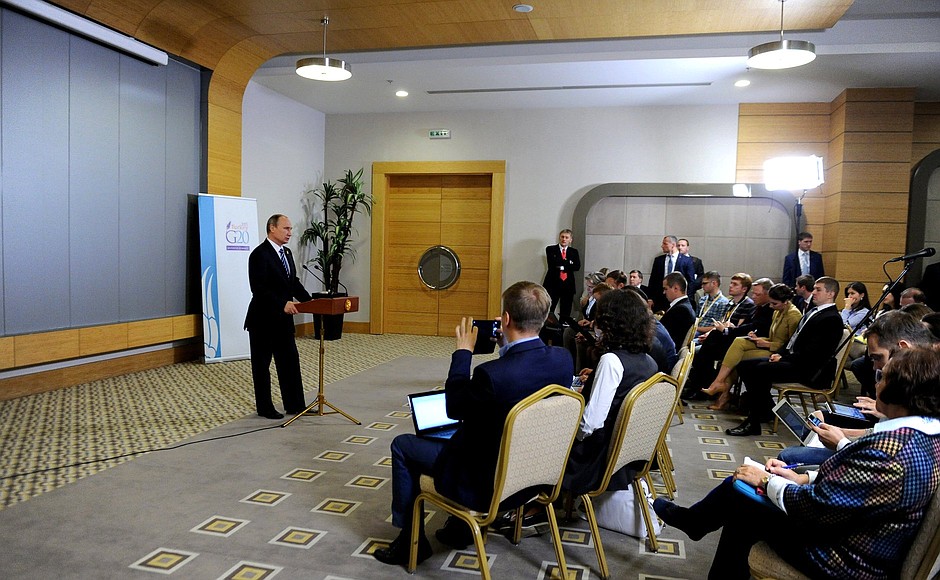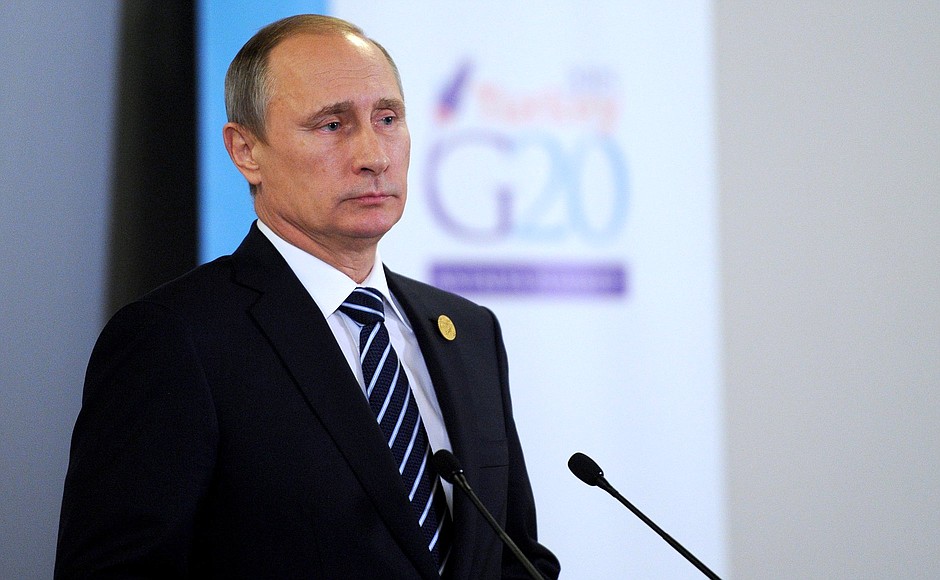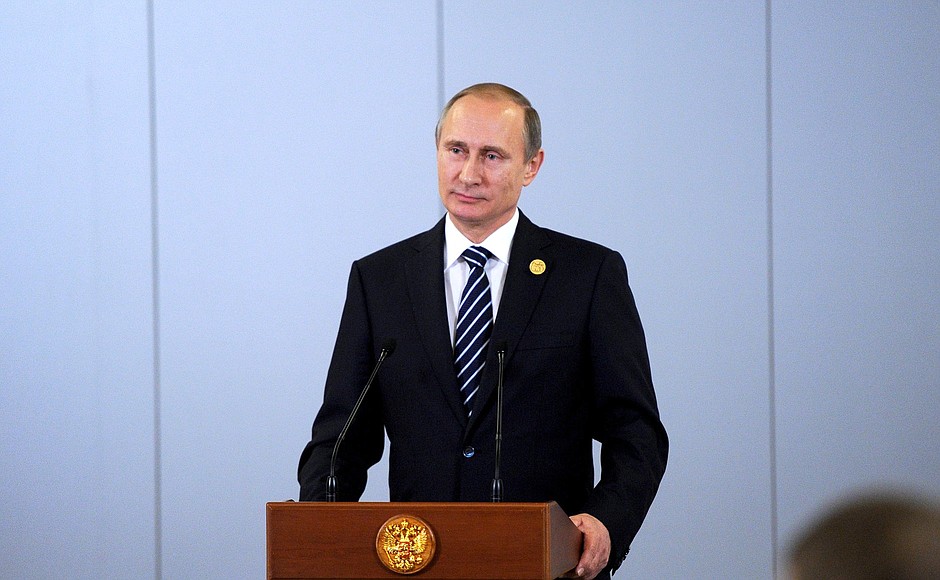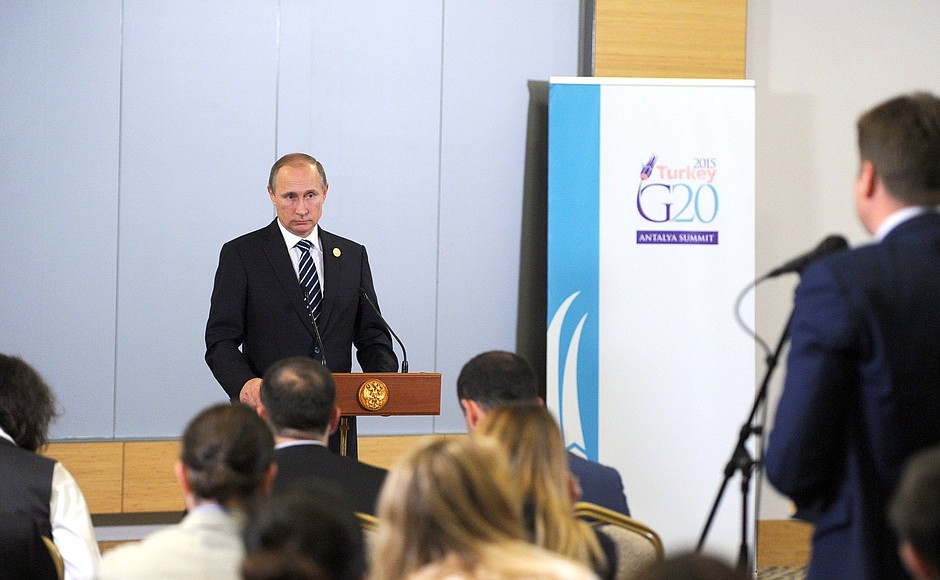President of Russia Vladimir Putin: Good evening, friends, ladies and gentlemen,
Before we start these questions and answers, I want to thank the President of Turkey, Mr Erdogan, and all of our Turkish colleagues for the very professional organisation of the G20 summit. They created a very good, trusting and open atmosphere in which to work and discuss the issues that were the whole point of our getting together.
I want to thank Turkey’s people for their welcoming attitude to our work and the help that we received at practically every step.
Question: It would seem that fighting terrorism was one of the summit’s main subjects of discussion. We know that there will be no resolving this problem unless we take more effective steps to prevent the financing of terrorism. Were any concrete measures discussed at the summit? What was the line of discussion on these measures, and did you reach any agreements?
Vladimir Putin: Yes, of course, this issue was one of the key issues, the fight against terrorism, especially after the tragic events with the hostage taking and loss of life in Paris. Yes, of course we are well aware that we must cut off the channels used to finance terrorism, and we discussed this.
I gave examples based on our information about individuals financing various Islamic State subgroups in different countries. We have established that financing is coming from 40 countries, including G20 countries. We discussed this issue.
We discussed the need to implement the relevant UN Security Council resolution, which was adopted on Russia’s initiative, on preventing financing of terrorism, unlawful trade in objects of art after terrorists pillage museums in the territories they seize, and unlawful sale of oil and petroleum products and earnings from this sale.
I also showed our colleagues satellite images and aerial photographs that show very clearly the scale of this illegal trade in oil and petroleum products. You see columns of refuelling vehicles stretching for dozens of kilometres in lines so long that from a height of 4,000–5,000 metres they vanish over the horizon. It really looks more like an oil pipeline system.
We discussed this issue together, of course, and I hope that we will continue this work, which I think is extremely important for the fight against terrorism.
Question: Mr President, economic issues were always the G20’s primary focus. Among the economic issues you discussed with the other leaders, which do you see as particularly important? Another question: You discussed economic matters on the summit’s sidelines too and met with the head of the IMF. What did you discuss, what was the outcome of the talks, and what was the nature of the proposals you made regarding Ukraine’s debt to the IMF?
Vladimir Putin: Yes, the G20 is primarily an economic summit, a summit for discussing economic matters, and so as well as the fight against terrorism after the recent events and the terrorists’ increased activity, we discussed economic issues too, of course. I would highlight investment issues, particularly investment in big infrastructure projects and support for small and medium businesses.
I would also note the issue of fighting tax evasion and illegal reduction of tax base.
A third issue I would highlight is that of older people’s involvement in labour activity and labour market issues in general. There are two aspects here: reducing youth unemployment (the G20 has set the objective of bringing the level down to 15 percent over the next few years), and, as I said, employment for senior citizens, the so-called ‘silver’ economy.
All developed countries have an aging population now. The amount of labour resources is decreasing, the number of people making payments into pension funds is falling, but the number of people who have reached retirement age is increasing. This is a big challenge for the developed countries’ economies, and we discussed this issue, of course.
I would also note the climate change issue, which is closely related to economic development issues and ensuring economic growth.
On the IMF, this is one of the biggest problems in our relations with Ukraine right now, and it is a matter we have been discussing actively over these last months with our colleagues from the International Monetary Fund.
Our partners from the IMF have been convincing us that we could accept to restructure Ukraine’s debt of $3 billion, which was to have been paid by the end of next month, the end of this year. They say that we could make a concession to Ukraine and defer this payment of $3 billion to next year. They say that this would help Ukraine and would ensure that Russia, as the creditor, receives its payment.
We drew our partners’ attention to the fact that our debt is not a private debt, but is sovereign debt that was offered to Ukraine on non-market principles and conditions. But in order to ensure the return of this money, and to avoid putting Ukraine in a difficult situation, we made what I think was an unexpected proposal to our partners. Not only did we agree to a restructuring of Ukraine’s debt, but we proposed better conditions for this restructuring than those the International Monetary Fund requested of us.
We were asked to defer this payment of $3 billion to next year. I said that we are ready to accept a deeper restructuring with no payment this year, a payment of $1 billion next year, $1 billion in 2017, and $1 billion in 2018. But our partners are sure that Ukraine’s solvency will grow and that we can be sure of receiving $3 billion next year. If this is the case, they see no risk in providing guarantees for this credit.
We have asked for such guarantees either from the United States government, the European Union, or one of the big international financial institutions. We hope that this matter will be settled by the start of December this year, given the International Monetary Fund’s work timetable.
I discussed this matter with Ms Lagarde, and also had the chance to have brief exchanges with the President of the United States and the US Secretary of the Treasury. They reacted to our proposal with interest. We agreed with our partners to discuss the details of our proposal very soon.
If our partners are that certain that Ukraine’s solvency will improve, persuade us that this is so, and believe this themselves, let them provide guarantees. If they cannot provide guarantees, this means that they do not believe in the Ukrainian economy’s future. I think this would not be good for them if this is so, and if they are trying to convince us of something that is not in fact the case, this would not be good for our Ukrainian partners either.
We think that this proposal is a realistic possibility and we see no problems in sharing the risks with our partners.
Question: Mr President, experts have talked extensively about continuity in the Turkish presidency’s agenda and the 2013 summit hosted by Russia in St Petersburg. Do you feel this continuity has been proven?
Vladimir Putin: Yes, of course.
First of all, we worked very actively within the framework of the G20 at the expert level back in St Petersburg to implement our suggestions related to preventing tax avoidance and tax base reduction. In Russia, we developed a whole set of measures and even passed a federal law on controlled foreign companies. This was within the framework of the agreements that were reached in St Petersburg.
At the expert level, we worked actively with OECD representatives and developed an action plan on this matter. And we talked about this now as well, noting that we must begin work to implement it. So in this regard, we see continuity in the Turkish presidency, as well as on issues of investments – after all, we were just talking about this, particularly with regard to infrastructure projects.
Question: There has been much talk after the events in Paris that there may be fundamental changes, qualitative changes in the relations between Russia and the West. How do you feel about this? Have you seen any specific proof of this in your meetings, for example with the Prime Minister of the United Kingdom today, or the President of the United States yesterday?
Vladimir Putin: You know, we never renounced good relations with our partners in the East or the West. And the unilateral measures limiting our cooperation in various areas were initiated by our partners, not us. If our partners now feel that the time has come to somehow change our relations, we welcome this; we never renounced joint work or closed our doors. It did seem to me that – at the expert level, at least – at the level of discussing problems, there is clear interest in renewing work in many areas, including the economy, politics, and security.
Reply: Last year, many people stated that you were an outcast at the G20 summit among its leaders. This year, you are a player because of Syria. What do you think about this? Do you agree with this interpretation of the events?
Vladimir Putin: Last year I already spoke about it. Our Australian colleagues created very good working conditions; everything was very good, without any problems. But it seems that somebody wanted to convey this idea you just stated to the public, that Russia was somehow isolated. Nothing like this happened.
As for the fact that I left a little earlier, I can let you in on a secret, I think I already spoke about this: I left due to technical reasons, so as not to wait in line to take off. That is all. It was a 14-hour flight to Moscow, so I simply needed to be the first to get on the plane. I know how the protocol services schedule flights, I would need to wait three hours to leave earlier, that’s all.
There weren’t any problems then or now, although naturally, relations were tenser than today. You can feel it, it’s true. But life goes on, everything changes: new problems come up, new threats, new challenges, that are difficult to resolve on one’s own, without others. We need to join forces.
Question: I’ll return to the topic of terrorism.
There has been a series of tragic events throughout the world in the last month, in a range of locations: explosions in Bagdad, preparations for bombings and terrorist attacks in Istanbul, a Russian plane crash (I know that there is no official version of what happened, but all the experts believe that the version of a terrorist attack cannot be excluded), and the recent horrible events in Paris.
France launched a massive attack, a military operation in Syria. At every meeting or big gatherings here, every leader spoke of the need to join forces. Do you feel it is possible to create a truly unified anti-terrorist coalition in these conditions? And what would it look like? Because everyone is talking about joining forces, but nobody is actually saying what parameters should be involved and how this coalition should look.
Vladimir Putin: Of course, I think that not only can it be done; it must be done. If you recall, I already spoke about this at the 70th anniversary session of the UN General Assembly. That is precisely what I said. And the tragic events that followed only confirmed that we were right.
As for how this should look: there is nothing difficult about it. We must organise specific work to prevent terrorist attacks and fight terrorism on a global scale. We also suggested engaging in anti-ISIS cooperation. Unfortunately, our partners in the United States initially refused. They simply sent a written note that said, “We decline your suggestion.”
But indeed, life moves fast and often teaches us lessons. And I think that now, everyone is becoming aware that the only effective way to fight terrorism is to fight it together.
We never closed the doors to this cooperation. We feel that this cooperation can be established at a political level and at the level of the special services that must work together more actively, exchanging information, helping one another and warning one another of danger.
As for Syria, we must first decide – and the foreign ministers are working on this now – which groups we consider terrorist organisations, and which are simply armed but nevertheless a part of Syria’s healthy opposition, and focus our efforts on fighting the terrorist organisations specifically, in order to create conditions for a political settlement of the Syrian conflict.
Question: Mr President, you had a meeting with Recep Tayyip Erdogan on the sidelines of the summit. This was your first contact since the Turkish elections, where Erdogan and his party confirmed the status quo in Turkey’s political life. With regard to this, was it harder for you to talk with the Turkish side about, for example, Syria, and what will happen to projects like TurkStream or other energy projects that you agreed upon?
Vladimir Putin: No, there were no difficulties. On the contrary, we can see some rapprochement. The President of Turkey is a straightforward, open person. He is a hard negotiator, but nevertheless, he is a man of experience and clearly strives to find a solution as well. So yesterday, he and I had a long conversation about our bilateral relations and about settling the Syrian crisis.
It seemed to me that we can find some common points that will allow us to achieve common success. First and foremost, this has to do with the fact that the President of Turkey, as he told me directly yesterday, feels that the Syrian crisis can only be resolved by political means, and we must create conditions for promoting this political process.
As for bilateral projects, I do not see any problems in general. We worked in the past, and continue to work on these issues. There are some problems and issues concerning trade, roughly speaking – what came first, the chicken or the egg? What came first, the TurkStream project, its legal registration or the discounts on gas we supply to the Turkish market? Or was it the discounts first and then the legal registration?
In any case, Turkey is interested, as we were told, in maintaining and increasing the sales of our goods on its market, and in this case, we are talking about gas deals. And we looked at various options for resolving the issues that are of mutual interest to us.
Question: I would like to return to Ukraine, especially since you met with Angela Merkel yesterday, and Germany is a member state of the Normandy format. Was the Ukrainian crisis discussed? And are you concerned that while the global community is focused on the topic of fighting terrorism, the conflict in Donbass might reignite?
Vladimir Putin: We believethat there is enough stamina, wisdomand responsibility among all people this depends on. And we are not going to watch the situation in southeast Ukraine getting worse; on the contrary, we will help to ensure that the actual ceasefire we managed to achieve through a great deal of effort is not broken, that it will promote the political process.
As regards the discussion on Ukraine, indeed, I think it is natural and there is nothing strange about it: after the tragic events in Paris, after the crash of our plane, a situation wheremuch remains unclear, we spoke first and foremost about these problems. But nevertheless, Ukrainian issues did not disappear from the agenda. I discussed these issues with practically all my colleagues whom I met in the bilateral format, and this topic has not been forgotten.
Question: Mr President, we frequently hear your western partners accuse Russia’s Aerospace Forces of hitting targets in Syria that are not ISIS, but are so-called moderate opposition groups. Did their opinion change over the course of the summit? What were you feeling during the discussions?
And the second part of the question. The US-led anti-ISIS operation did not succeed in degrading ISIS. What difference do you see between Russia’s actions in Syria and those of the US-led coalition, from a military standpoint?
Vladimir Putin: In general, this criticism was practically not voiced. It’s hard to even criticise us. They tell us, “You’re hitting the wrong targets!” Then we say, “Tell us where we should strike, give us the targets!” But they don’t give them to us. “Then tell us where we shouldn’t hit.” And they don’t tell us that, either. How, then, can we be criticised?
You know, I don’t want to sneer at this. Strangely enough, they have their own reasons for it. And one of them, I will tell you point blank, is that they are afraid to give us a list of territories not to strike, because they fear that this is exactly where we will strike, that we will deceive them. It seems they judge us based on their own notions of decency.
But I can confirm that right now (on the battlefield, so to speak), we have established contacts with some (not all, of course) of the uncompromising, even armed Syrian opposition groups; they themselves asked us not to strike the territories they control. We have reached these agreements and are fulfilling them.
Moreover, this part of the armed opposition believes that it is possible to begin active operations against terrorist organisations – against ISIS first of all – with our support from the air. And we are prepared to provide that support. If this happens, it will mean that President al-Assad’s army on one side and the armed opposition on the other are fighting their common enemy. It seems to me that this can become a good foundation for subsequent work and a platform for political settlement.
Indeed, when I was in Paris recently within the framework of the Normandy format, I suggested this idea to President of France Mr Hollande. We made the first steps in this direction and overall, so far, they are positive.
We very much need the help and support of the United States, European nations, Saudi Arabia, Turkey and Iran in order to make this process irreversible. This is another matter that I discussed with my colleagues today in a great deal of detail.
Question: A fair amount of time has passed since the Russian plane crash, and certain complications remain, which you spoke about. When can we expect a final version as regards the reasons for this tragedy?
And second, if I may. In your view, how great is today’s threat that what happened in Paris might happen again in Russian cities? What is being done to minimise these threats?
Vladimir Putin: Unfortunately, nobody can be guaranteed against terrorist attacks. For example, France is among the nations that took a rather firm stance with regard to President al-Assad personally. We constantly heard our French friends say that their precondition for the launch of political changes should be an agreement on President al-Assad’s resignation. So what – did that save Paris from a terrorist attack? No.
I think we should not push forward issues that are of secondary importance. What we must do is join efforts in the fight against terrorism and terrorist organisations, and based on that agree on political reforms.
As for the plane crash, this is extremely painful for all of us, for all the Russian people, regardless of the cause of the crash. A huge number of people died and this is a great tragedy for all of us. Yes, we are aware of all the possibilities, and all of them are being examined. We will be able to come to a final conclusion after all trials and expert assessments are completed. What expert assessments are those? If there was an explosion, then traces of explosives should remain on the fuselage shell and passengers’ belongings. This is certain. And we have enough equipment and good, world-class experts in this domain who are capable of discovering those traces. Only then can we talk about the reasons for this tragedy.
Your colleague asked whether the western nations were working effectively or not, whether we are working effectively in the fight against, for example, ISIS or other terrorist organisations. I do not think this is the time to talk about who is working more or less effectively. French planes have now increased the number of combat missions, but if you consider and look at how much our pilots have done recently, then you will understand the intensity of that combat operation.
But I repeat, now is not the time to assess who is better or worse, or look for reasons why the previous steps have been more or less effective. Right now, we need to look forward and join forces in the fight against this common threat.



